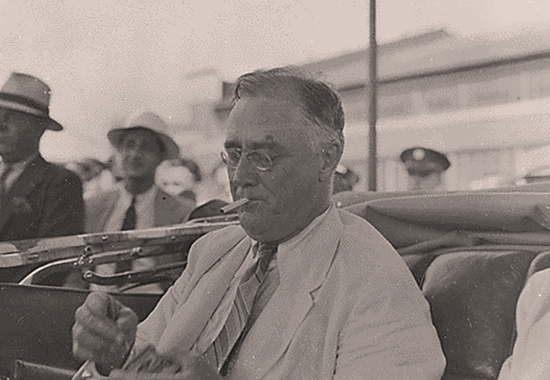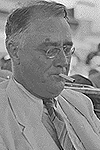|

FRANKLIN D. ROOSEVELT IN 1936
Good Neighbor Policy
|
|
Go here for more about
 Franklin
D. Roosevelt. Franklin
D. Roosevelt.
Go here for more about
 Good
Neighbor Policy speech. Good
Neighbor Policy speech.
It follows an excerpt text transcript of
Franklin D. Roosevelt's Good Neighbor Policy
speech, delivered at Chautauqua, New York - August 14, 1936. |

 |
Long before I
returned to Washington as President of the
United |
States, I had made up my mind that,
pending what might be called a more opportune
moment on other continents, the United States
could best serve the cause of a peaceful
humanity by setting an example. That was why on
the 4th of March, 1933, I made the following
declaration:
In the field
of world policy I would dedicate this nation
to the policy of the good neighbor--the
neighbor who resolutely respects himself
and, because he does so, respects the rights
of others--the neighbor who respects his
obligations and respects the sanctity of his
agreements in and with a world of neighbors.
This declaration
represents my purpose; but it represents more
than a purpose, for it stands for a practice. To
a measurable degree it has succeeded; the whole
world now knows that the United States cherishes
no predatory ambitions. We are strong; but less
powerful nations know that they need not fear
our strength. We seek no conquest. We stand for
peace.
In the whole of the Western Hemisphere our
good-neighbor policy has produced results that
are especially heartening.
The noblest monument to peace and to neighborly
economic and social friendship in all the world
is not a monument in bronze or stone, but the
boundary which unites the United States and
Canada--3,000 miles of friendship with no barbed
wire, no gun or soldier, and no passport on the
whole frontier. Mutual trust made that frontier.
To extend the same sort of mutual trust
throughout the Americas was our aim.
The American republics to the south of us have
been ready always to cooperate with the United
States on a basis of equality and mutual
respect, but before we inaugurated the
good-neighbor policy there was among them
resentment and fear because certain
administrations in Washington had slighted their
national pride and their sovereign rights.
In pursuance of the good-neighbor policy, and
because in my younger days I had learned many
lessons in the hard school of experience, I
stated that the United States was opposed
definitely to armed intervention.
We have negotiated a Pan American convention
embodying the principle of nonintervention. We
have abandoned the Platt Amendment, which gave
us the right to intervene in the internal
affairs of the Republic of Cuba. We have
withdrawn American Marines from Haiti. We have
signed a new treaty which places our relations
with Panama on a mutually satisfactory basis. We
have undertaken a series of trade agreements
with other American countries to our mutual
commercial profit. At the request of two
neighboring republics, I hope to give assistance
in the final settlement of the last serious
boundary dispute between any of the American
nations.
Throughout the Americas the spirit of the good
neighbor is a practical and living fact. The
twenty-one American republics are not only
living together in friendship and in peace--they
are united in the determination so to remain.
To give substance to this determination a
conference will meet on Dec. 1, 1936, at the
capital of our great southern neighbor
Argentina, and it is, I know, the hope of all
chiefs of state of the Americas that this will
result in measures which will banish wars
forever from this vast portion of the earth.
Peace, like charity, begins at home; that is why
we have begun at home. But peace in the Western
world is not all that we seek.
It is our hope that knowledge of the practical
application of the good-neighbor policy in this
hemisphere will be borne home to our neighbors
across the seas.

More History
|
|